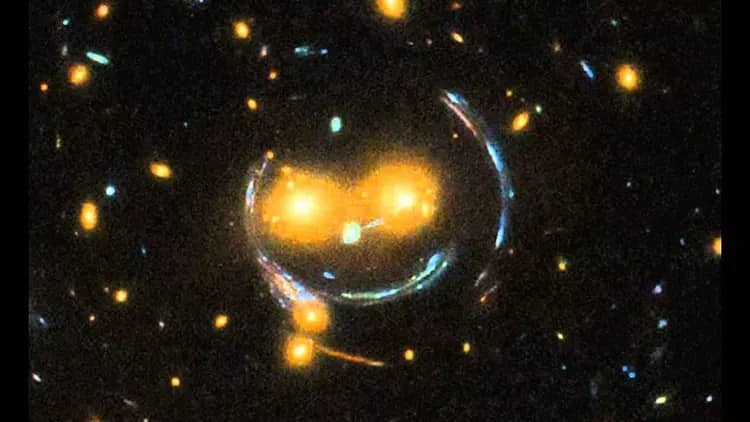Einstein Zig-Zag Poem by Harley White
Einstein Zig-Zag
This title provocative in the text
filled me with wonder and left me perplexed.
In heaven's name what could this marvel be
that looked like a grin in hyperbole?
On first thought the heading seemed like a gag
for how could light from a quasar zig-zag?
Nonetheless, a galactic scheme at heart
with a distant quasar playing a part
a gravitational lens could design
making smiley face out in space to shine.
Or is it a grimace and not a grin
that expresses bewilderment therein?
Perhaps it's surprise, well we could surmise
continually about that strange guise…
As the text in the article narrates,
we are told that the light originates
from eleven billion light years away
in the scopic spectacle on display
from the Hubble's six images distinct
all together in this mise-en-scène linked.
In apropos Carl Sagan ‘Cosmos' quote
from a rare long poem that Hart Crane wrote,
‘Stars scribble frosty sagas in our eyes, '
said he, ‘the gleaming cantos in the skies
‘of unvanquished space, ' in words that still shine
like the stars he writes of in lyric line…
The zig-zagging lens that stares out and back
could help us celestial puzzlements crack.
To cosmologist Martin Millon cite,
he called system promising to shed light
on how space itself stretches over time
in mysteries of cosmic paradigm.
As we look at that visage peering out
in seeming perusal as turnabout
of starry-eyed earthlings who guide their gaze
to beyonds of interstellar byways,
some may pause for a moment to ponder
whether there are any beings yonder
whose thoughts now and then may wander to us
as creatures imagined existing thus.
So whether a grimace or be it grin
a seeming phantasm abides therein
summoning scrutiny firmament-wise
where illusions optical crystalize.
In a final notion for poem's end
as troublesome worries pass ‘round the bend,
two amateur starwatchers left behind
for astronomers hereafter to find
on their tombstone epitaph some phrases
expressing their own personal praises
of what they might sense on approaching death
at perhaps their almost ultimate breath
when musing upon upcoming demise
and which meditations might then arise
of stelliferous marvels overhead
or how would vanish their feeling of dread.
‘We have loved the stars too fondly', quoth they,
to be fearful of night' at close of day.

This poem has not been translated into any other language yet.
I would like to translate this poem